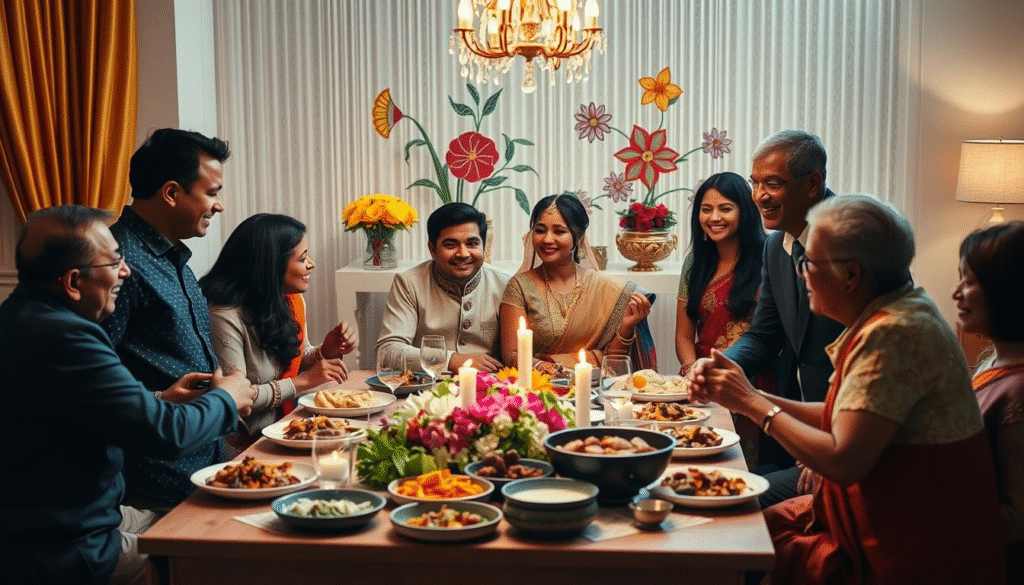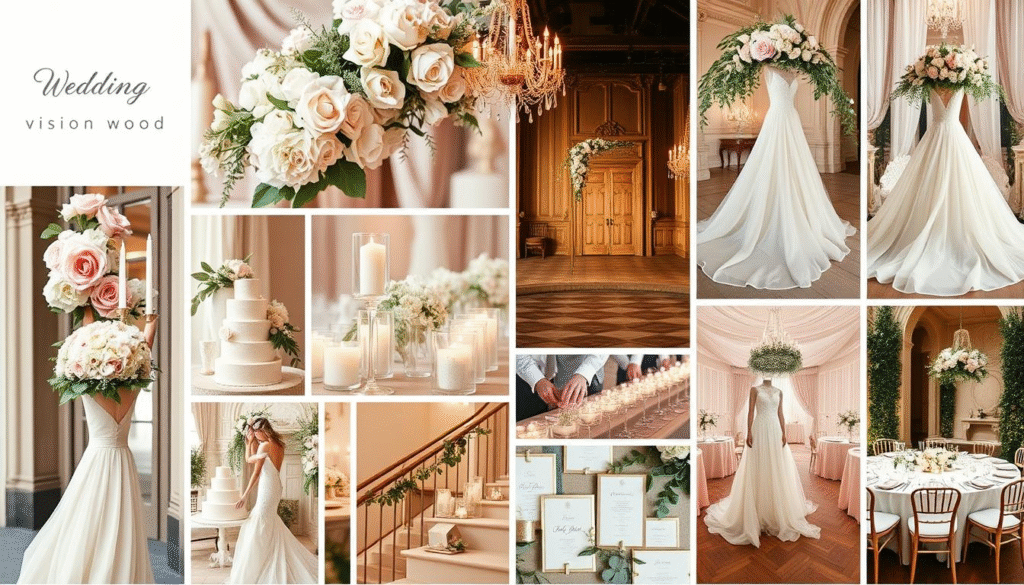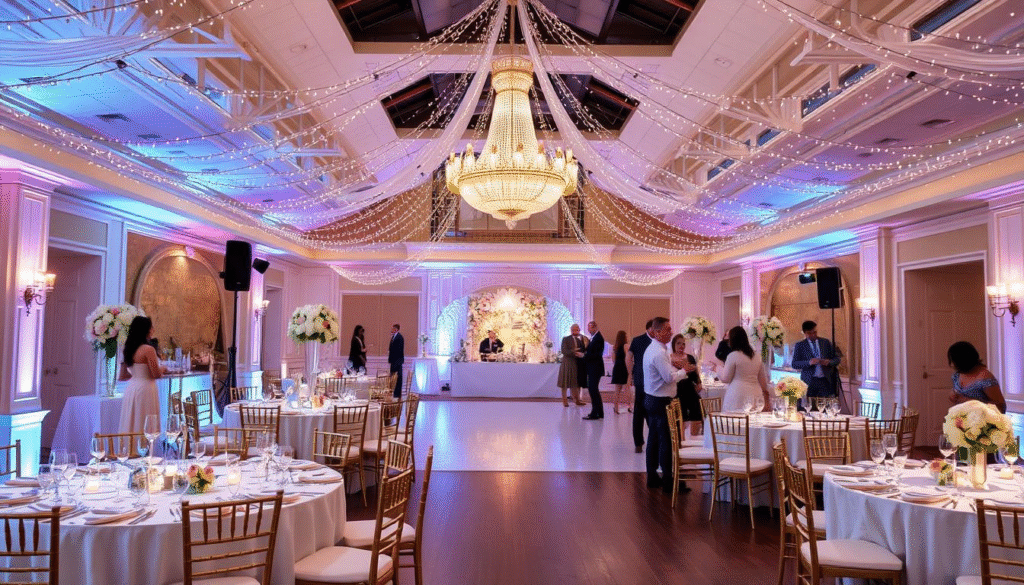As we journey through life, love and partnership evolve. They intertwine with our backgrounds and beliefs. Islamic marriage is more than a union of two people. It’s a celebration filled with rich traditions, customs, and rituals that show deep faith.
Every nikah is a mix of shared values and family bonds. These echoes through generations, adapting to today’s world. By diving into this world, we see the deep meaning of Islamic marriage. It shapes the lives and futures of couples in the Muslim community.
Understanding Islamic Marriage: An Overview
Islamic marriage is more than just a personal bond. It’s deeply rooted in culture, society, and faith. It’s seen as a sacred union and a strong partnership. It focuses on love, respect, and care between partners, highlighting the value of commitment and family.
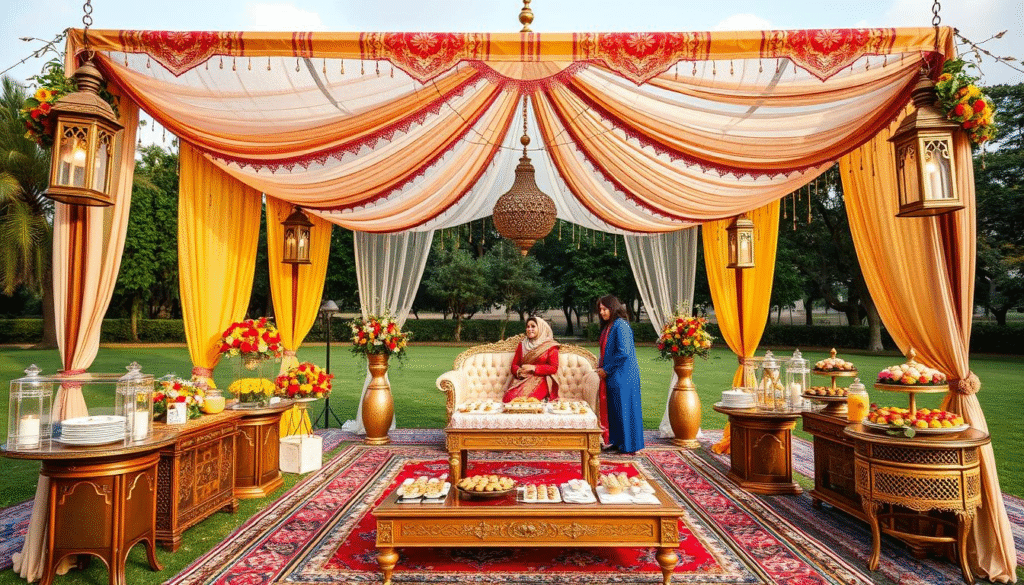
Islamic marriage overview
The roots of Islamic marriage come from the Quran and Hadith. These texts show marriage as a noble choice for people. It’s about companionship and support within the law, promoting stability and peace in society. Muslim matrimony is about shared values, duties, and loyalty.
Key principles of this institution include:
- Commitment: A sincere pledge to uphold the partnership.
- Respect: Acknowledging and honoring each other’s rights and duties.
- Compassion: Fostering emotional connections that uphold love and support.
In essence, Islamic marriage is not just about personal happiness. It’s about spiritual and communal duties too. This deep approach to relationships impacts many families and individuals in the Muslim world.
Significance of the Nikah Ceremony
The nikah ceremony is a key part of marriage in Islam. It’s more than just a ritual; it’s a deep commitment that ties the couple legally and spiritually. This ceremony shows the faith’s values and traditions, starting a journey guided by God.
Meaning and Importance
The nikah ceremony makes a couple’s union official, setting a path for their relationship. In Islam, marriage is seen as a duty and a way to fulfill religious obligations. It’s not just about the law; it’s about love, support, and being together.
Key Components of the Nikah Ceremony
Knowing what makes up the nikah ceremony helps us see its deep meaning. Key parts include:
- Ijab and Qabul: These are the offer and acceptance, showing the couple’s agreement.
- Witnesses: Two witnesses are needed to make the ceremony official, adding trust and transparency.
- Mahr: The dowry shows respect and responsibility, proving the husband’s commitment.
These elements make the nikah ceremony more than just a legal step. They show the rights and duties of both partners. Understanding these values helps us see the true importance of this islamic marriage ceremony.
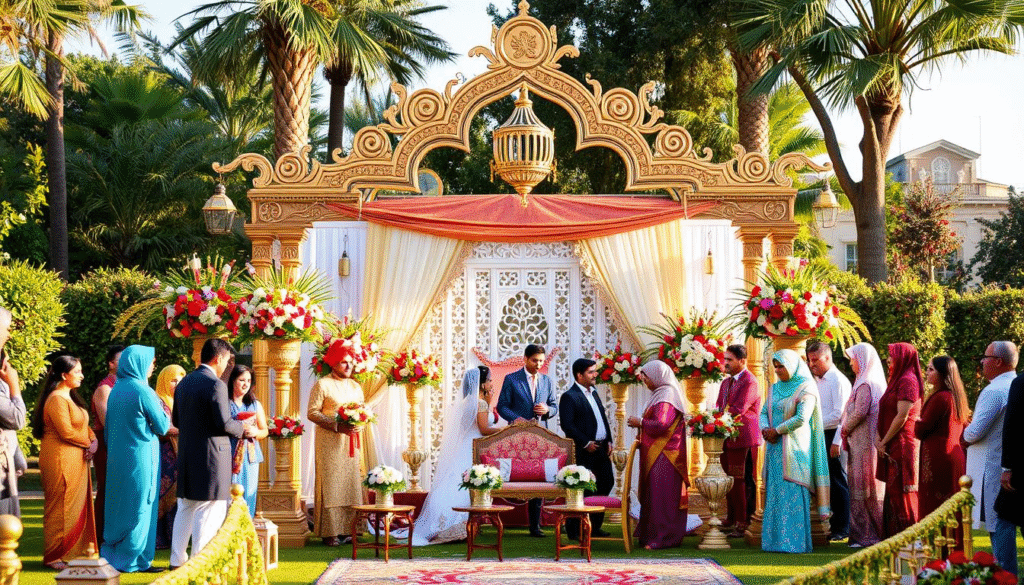
Islamic Marriage Traditions Across Cultures
Islamic marriage traditions show a rich mix of cultural practices worldwide. These traditions are shaped by local customs, religious beliefs, and social norms. This leads to interesting variations in muslim wedding customs. From South Asia to the Middle East and Africa, each culture brings its own special touch to marriage celebrations.
Regional Variations
Different regions have their own unique practices that reflect their cultural heritage. In South Asia, weddings are grand, with colorful clothes, big decorations, and many pre-wedding rituals. The mehndi ceremony, where henna designs are put on the bride’s hands and feet, is a favorite tradition.
In the Middle East, weddings focus on signing the marriage contract, highlighting the legal and religious sides of islamic marriage traditions. There’s a big feast where family and friends come together, showing the importance of hospitality in these celebrations.
Blending Modern and Traditional Practices
As time goes by, many couples face the choice between tradition and modernity. They mix new things into old customs to create special wedding experiences. For example, they might use technology, like live-streaming the ceremony, while keeping important traditions like the Nikah.
This mix of old and new is becoming more common. It shows how modern Muslims want to celebrate their heritage and also try new things. This change in muslim wedding customs shows broader societal shifts and the wish to make each wedding truly unique.
| Region | Unique Traditions | Modern Trends |
| South Asia | Mehndi ceremony, extravagant celebrations | Incorporating multimedia presentations, live streaming |
| Middle East | Focus on marriage contract, lavish feasts | Personalized decorations, themed weddings |
| Africa | Community involvement, traditional dances | Simplified celebrations, eco-friendly practices |
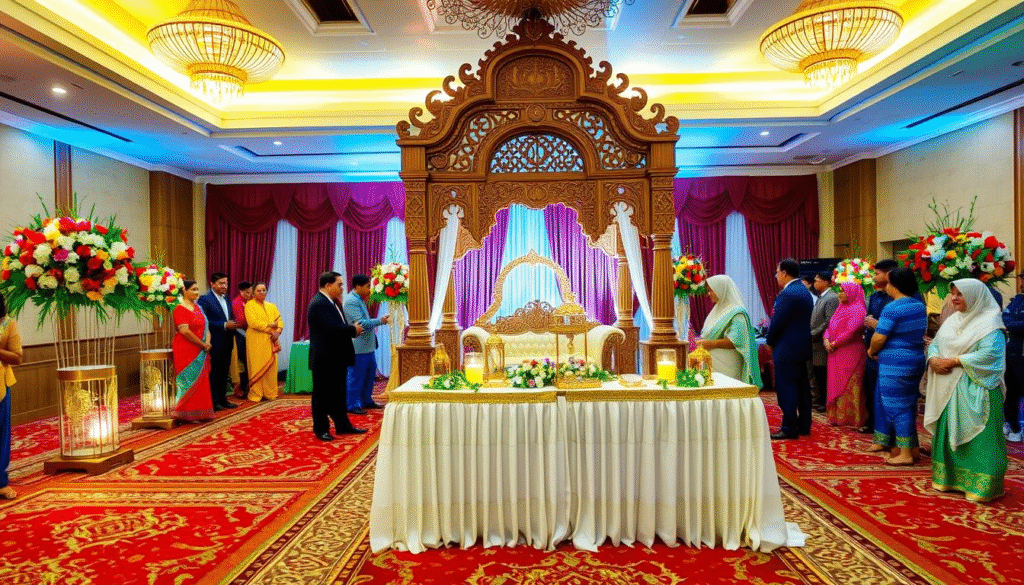
Islamic Marriage Customs and Rituals
Islamic marriage customs include many rituals that show cultural importance and family ties. These customs fall into two main groups: pre-wedding rituals and post-wedding celebrations. Each part adds to the beauty of Islamic marriage practices and strengthens community bonds.
Pre-Wedding Rituals
Pre-wedding practices are key in Islamic marriage rituals. Engagement ceremonies, called miseen, announce a couple’s plans to marry. These events include family meetings, gift exchanges, and blessings between families.
Another important custom is the bridal shower, or mayoon. It lets family and friends shower the bride with love and gifts. These rituals celebrate the couple and strengthen family bonds.
Post-Wedding Celebrations
After the wedding, post-wedding celebrations are a big part of Islamic marriage customs. The Walima, a grand feast by the groom’s family, announces the marriage to everyone. It shows the community’s support and the couple’s new life together.
These celebrations are important because they bring families and friends together. They celebrate the newlyweds and spread joy and unity.
The Role of the Islamic Marriage Contract
The islamic marriage contract, known as the nikah contract, is key in marriage in islam. It creates a strong bond between spouses. It also outlines the rights and duties of both partners.
Important parts of the islamic marriage contract are:
- Responsibilities: It clearly states what each spouse should do. This builds respect and understanding.
- Financial Considerations: It talks about money matters. This makes things fair and clear.
- Entitlements: It lists the rights of each partner. This gives them power in the relationship.
This contract gives structure and shows the couple’s commitment. It helps them understand their roles in the marriage.
Islamic Marriage Rules and Laws
Islamic marriage laws set out a clear path for marriage. They cover who can get married and the duties of marriage. It’s important for couples to know these rules to follow Islam’s teachings.

Eligibility Requirements
There are key factors that decide if someone can get married in Islam. These include:
- Age: Sharia law sets a suitable age for marriage.
- Consent: Both partners must agree freely for a valid marriage.
- Religious Considerations: Both must share the same faith or meet Islamic standards if one is not Muslim.
Rights and Responsibilities in Marriage
The rights and duties in marriage are central to Islamic marriage. They focus on equality, with both partners respecting each other. Important points are:
- Financial Obligations: The husband usually supports the family financially, while the wife manages the home.
- Emotional Support: Both should offer emotional and psychological support.
- Respecting Boundaries: Each must respect the other’s privacy and personal space.
This structure helps couples build a strong, understanding relationship.
Islamic Marriage in the Quran
The Quran is key to understanding Islamic marriage. It shows marriage as a sacred bond between two people. A key verse says, “And among His signs is this, that He created for you mates from among yourselves, that you may dwell in tranquility with them” (Quran 30:21). This verse talks about love, mercy, and being together.
Islamic teachings in the Quran talk about the roles of partners in marriage. They stress the importance of respect and support. The Quran says spouses should be like clothes to each other, giving comfort and protection.
The Quran’s teachings on marriage are not just for the past. They guide us today. They encourage couples to work on their relationship and keep family values alive.
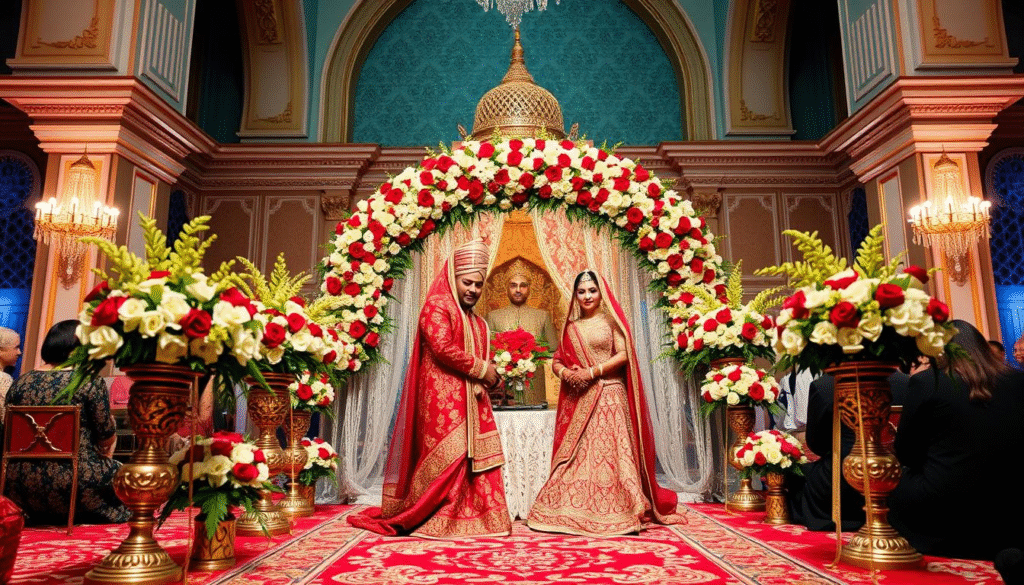
Halal Marriage: What It Means
Halal marriage is a key idea in Islamic relationships. It’s not just a legal bond but also a moral one. It means being respectful, trustworthy, and having a good partnership.
Understanding Halal in Context of Marriage
A halal marriage follows Islamic rules. It helps both partners grow emotionally and spiritually. It’s about building a loving, moral home together.
The Importance of Family Approval
Family approval is vital in halal marriage. It shows the community’s support for the couple. Getting family approval shows respect for tradition and strengthens family ties.
| Aspect | Halal Marriage | Significance |
| Compliance with Islamic Law | Essential | Ensures ethical conduct in the relationship |
| Mutual Respect | Prominent | Fosters a nurturing and supportive environment |
| Family Approval | Crucial | Strengthens community ties and support |
Islamic Premarital Counseling: A Necessary Step
Islamic premarital counseling is a key step for couples thinking about marriage. It helps them get ready emotionally and gives them tools for the future. Knowing why it’s important makes their marriage stronger.
Purpose and Benefits
The main aim of islamic premarital counseling is to improve communication and understanding. Topics covered include:
- Effective communication techniques
- Conflict resolution strategies
- Rights and responsibilities within marriage
The benefits of premarital counseling go beyond just getting ready. Couples feel more confident in facing challenges together. It also stresses the importance of shared values and respect, building a strong partnership.
Studies show couples who get counseling before marriage have lower divorce rates. This shows how important it is. The counseling helps them talk about big issues, leading to healthier relationships.
Conclusion
Islamic marriage is a key part of Muslim life, bringing together individuals, families, and communities. This article looked at the many sides of Islamic marriage traditions and customs. It highlighted the Nikah ceremony and the different rituals found in Islamic weddings.
Every step, from getting ready for the wedding to celebrating after, shows the importance of culture and community. Understanding these customs helps us see the love, respect, and unity at their heart. The mix of local traditions and old customs makes each wedding special and meaningful.
Islamic marriage is a rich tradition that shows a deep commitment to partnership and support. As people go through this journey, they are reminded to value their personal bonds and respect their community’s values. This bond, built on faith and understanding, makes Islamic marriage a deep celebration of life and love.
FAQ
What is the significance of an Islamic marriage contract?
The Islamic marriage contract, or nikah, is key. It sets the legal and spiritual base of the marriage. It protects both partners’ rights and outlines their duties and financial roles. This ensures both know what to expect and commit to in the marriage.
What are the key components of a nikah ceremony?
A nikah ceremony includes key parts. These are the mutual agreement (offer and acceptance), witnesses, and the mahr (dowry). The mahr is a gift from the groom to the bride, showing respect and commitment.
What are the traditional customs associated with Islamic weddings?
Islamic wedding customs vary but often include engagement ceremonies and bridal showers. There’s also the Walima celebration after the wedding. These customs strengthen family bonds and community ties, reflecting the couple’s culture.
How does Islamic marriage differ from other forms of marriage?
Islamic marriage is based on religious principles. It requires specific conditions from the Quran and Hadith. It focuses on mutual respect, love, and commitment, with a unique spiritual and social aspect.
What is the role of Islamic premarital counseling?
Islamic premarital counseling is essential. It helps couples prepare for marriage by teaching communication, conflict resolution, and understanding their roles. This builds a strong foundation for a successful marriage.
What are the eligibility requirements for marriage in Islam?
To marry in Islam, you need to meet certain criteria. These include age, consent, and following religious guidelines. Meeting these ensures a marriage that is both legal and spiritually recognized.
How does family approval influence Islamic marriages?
Family approval is vital in Islamic marriages. It shows the importance of community and family support. Getting family consent strengthens the marriage, which is key in Islamic matrimony.
What are some Islamic marriage traditions across different cultures?
Islamic marriage traditions vary by region. For example, South Asian weddings are known for their vibrant celebrations and music. Middle Eastern weddings, on the other hand, often have more formal rituals. This diversity highlights the beauty of Muslim matrimony.


